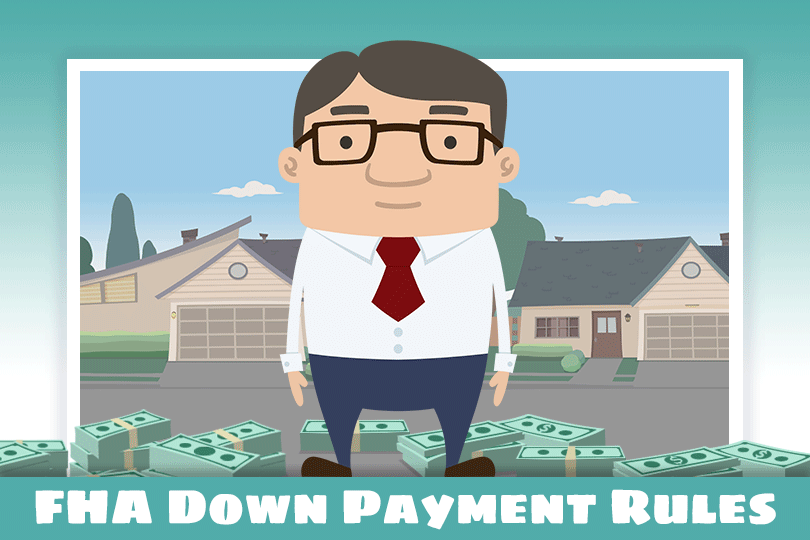Things to Know About Making an FHA Loan Down Payment
August 9, 2021
Lenders Need to Mitigate Risk
Making a sizeable down payment gives lenders peace of mind, knowing that a borrower would not part with a large amount of money if they did not intend to come through on the entire loan. Depending on the type of mortgage you apply for, the down payment requirement may vary. For most conventional loans, borrowers are generally required to pay 20% of the purchase price, whereas FHA loans have a low requirement of 3.5%. FHA-approved lenders feel more comfortable accepting this smaller amount since the loans are insured by the FHA, and the lenders are protected in the case of borrowers defaulting.
Private Mortgage Insurance
Even though most conventional loans come with the 20% minimum down payment criteria, there are borrowers who cannot meet that requirement. This does not always exclude them from being approved. In the same way the FHA charges a Mortgage Insurance Premium with their loans, conventional mortgage lenders require that any borrowers paying less than 20% toward the down payment must purchase Private Mortgage Insurance (PMI).
If you are considering a conventional mortgage, it is important that you understand how Private Mortgage Insurance works. While it helps you qualify for a loan that you could not otherwise afford, it does increase the cost of the loan itself. You can make a lower payment upfront, but the monthly PMI premium will be added into your monthly mortgage payments. Additionally, PMI does not protect you, it protects the lender from losses if you are unable to pay back the loan. In most cases, you will not have to make PMI payments for the life of the loan. Pertaining to the conventional loan, once you have built up more than 20% equity in your home, you can put in a request to have the monthly PMI charge dropped. Talk to your loan officer to make sure this is an option before you sign!
Down Payments and Interest Rates
While the amount of money you put down on a home may not affect the interest rate you receive from the lender, it does impact the amount of interest you pay over the life of the loan. Making a larger down payment means paying less in interest, since you are borrowing less money. Imagine that you are buying a $200,000-home with a down payment of $20,000. You would be paying interest on a $180,000 loan. (200,000 – 20,000). Whereas if you paid only $10,000 upfront, you’d be paying interest on a $190,000-loan instead.
Down payments are one of the most daunting factors of homebuying for many first-time buyers. Saving up such a huge chunk of funds is not always an affordable option for most people, and so they get stuck in a “renter’s trap.” While it can be a little overwhelming, it’s important for prospective homebuyers to do their research and learn about their options, including Down Payment Assistance Programs. Head to www.fha.com to for a comprehensive list of programs for each state.
------------------------------
RELATED VIDEOS:
Consider the Benefits and Risks of a Joint Loan
Borrowers Should Know About the Origination Fee
Everyone Needs to Pay Their Property Tax

FHA Loan Articles
November 12, 2024Escrow is an important feature of most typical FHA loans. An escrow account is a third-party account where borrowers deposit funds designated for property taxes and other uses. Requirements to use escrow accounts typically stems from a need to protect all parties involved in the transaction
November 2, 2024When it’s time to consider buying a home, the Federal Housing Administration (FHA) offers two popular options. One is the traditional FHA purchase loan many use to buy a house in the suburbs. But not everyone wants to buy an existing property. Some want more control over the design and configuration of the home.
The other FHA construction loan option, the one-time close mortgage, comes in here. This option is for those who want to approve floor plans, have a say in the types of materials used to build the home and choose its features.
October 31, 2024When buying a home for the first time, it helps to know how long the process can take. How do you know if your appraisal report is delayed if you don’t know how long the FHA allows for the process to be completed? How long does it take to get from the final offer to closing day? A “typical” FHA loan process may take up to 45 days from start to finish. Several factors can influence this timeline.
October 30, 2024Just because an FHA loan is designed to be more lenient with FICO scores and require a lower down payment doesn’t mean the house you buy with that loan is less than ideal. Did you know that FHA loans have minimum property standards to ensure the home is safe and livable? Those standards require the home to have an “economic life” for the entire term of the loan so you can freely sell the property later on if you choose to do so.
October 29, 2024Buying a home with an FHA mortgage is a major life decision, and preparation is essential before you start house hunting or consider making an offer on a property.
How to get started? In the early stages, establishing your budget and how much work you need to do on your credit is key. But once you have gotten past the initial phase of that planning you’ll want to consider the house itself and what you want from it.







